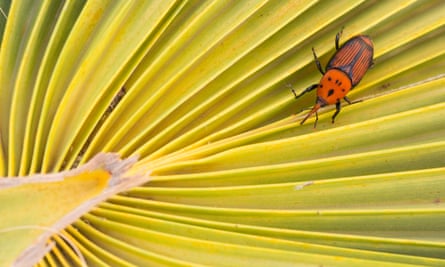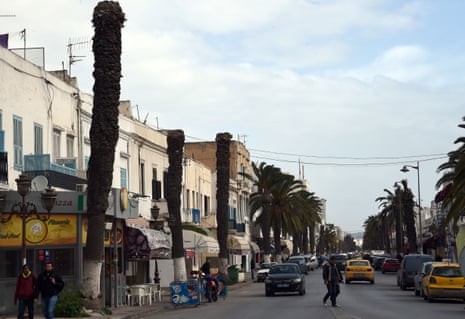It’s an unlikely but very real crisis for a country with a teetering economy: a tiny red devil is invading Tunisia and it could cost hundreds of thousands of people their livelihoods.
Morched Garbouj, president of a Tunisian environmental group, smiled as he told the popular legend of how the red palm weevil first arrived in Tunisia. “Some people say that it was the former dictator Ben Ali’s son-in-law who brought it here. He was known for bringing in exotic animals, exotic trees, that kind of thing.” He points to the fact that the area suffering the greatest devastation is in Carthage, around the presidential palace. “Well, maybe it’s true!”
The timing would fit. As the country was in the throes of revolution during the turbulent months of December 2010 and January 2011, the grand palm trees lining the boulevards of the upmarket suburb of Carthage began to die. From there, the infestation spread. Six years later – and despite what successive governments have claimed to be their best efforts – the infestation continues to spread, decimating palm trees in the north and gradually encroaching upon the vital crops in the south where lives depend on dates.
Tunisia leads the world in date exports. According to the ministry of agriculture, there are 5.4 million palm trees within the country and, while not all contribute to the $231m (£179m) that dates generate in exports annually, all are at risk from the spread of the weevil.
For Tunisia, those exports have rarely been more vital. Racked by a large balance of trade deficit, the Tunisian dinar is at a record low. With tourism revenues flatlining since the terror attacks of 2015 and widespread unemployment, date exports are vital to shore up the flagging economy.

In response to the crisis, the ministry of agriculture, along with the US embassy and Garbouj’s pressure group, SOS Biaa, held a three-day conference in Tunis this month to decide on action to combat the weevil’s spread. The US embassy is concerned about the dangers of the weevil and its potential repercussions for Tunisia and the wider region. The deputy chief of mission, Benjamin Moeling, said: “Tunisia’s democratic evolution has been a model for the entire Arab world. Tunisia has been a partner in the war on terrorism, particularly against al-Qaida and Isis in the region, and it is very difficult for any country to cooperate with international partners if it’s fighting economic disaster and unrest at home.”
Some of the world’s leading authorities on the red palm weevil and those who have successfully eradicated it assembled in Tunis. One of those was New Zealander Mark Hoddle. He and his team at the University of California, Riverside, successfully eradicated the pest from the state’s Laguna Beach.
Hoddle has few illusions about the challenge ahead. “This is probably the most severe insect threat the Tunisian date industry has ever faced,” he said. His team had studied similar invasions of countries with large date exports, and the outcomes were predictably uniform. “The insect comes in. It establishes itself in urban areas, like we’re seeing in Tunis, and spreads to agricultural production areas. The industry’s not prepared for that invasion, palm trees start dying and there’s a lot of panic.”
In Tunisia’s southern date-producing regions, that panic risks taking hold. Opening the conference, Tunisia’s minister of agriculture, Samir Taieb, acknowledged that much of the date production occurs in the country’s more marginalised regions, which typically experience high unemployment, as well as social unrest. It’s unclear how many are aware of the fresh threat to one of their few remaining sources of income.
That the weevil has yet to reach the region, Hoddle said, is largely down to luck and the fact that no infected palm trees had been shipped southwards. “If the weevil was to show up in the date-producing oases tomorrow, within months you’d start to see the trees showing the first signs of infection, and that’s what makes this weevil so dangerous. You don’t know you have an infestation until you start to see the trees with these very extreme symptoms.”
While Tunisia mulls over the options available to check the weevil’s spread – from thermal and acoustic imaging to various traps and lures – in the end, much will depend on public awareness and, ultimately, cooperation.
“If we take serious steps now, this can be eradicated,” said Garbouj. “Date exports represent a big chunk of our economy. We’re talking about hundreds of millions of dollars a year. The government has to be committed to fixing this.”
